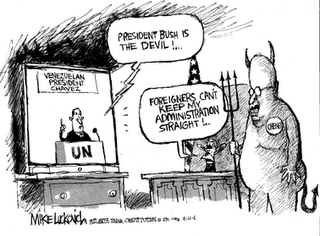 October is the month of Change. This October leads us right up to the election of 2006. Isn't it ironic that some of the Republicans' most powerful names on the 2006 ballot are those they want removed? From Tom Delay to Joe Foley, these disgraced leaders epitomize the corruption and the arrogance that have grown like a disease in our government. Truth and goodness have been replaced with lies and greed of the worst sort. Republican fundraiser Abramoff's crimes are but a symptom of this governmental power run amok. Our nation needs us all to remove the Corrupticans from office and restore integrity to Congress.
October is the month of Change. This October leads us right up to the election of 2006. Isn't it ironic that some of the Republicans' most powerful names on the 2006 ballot are those they want removed? From Tom Delay to Joe Foley, these disgraced leaders epitomize the corruption and the arrogance that have grown like a disease in our government. Truth and goodness have been replaced with lies and greed of the worst sort. Republican fundraiser Abramoff's crimes are but a symptom of this governmental power run amok. Our nation needs us all to remove the Corrupticans from office and restore integrity to Congress.Foley, like Governor McGreevy of New Jersey, is the latest victim of his own closet. Only in Foley's case, his repression has led to his preying on teenage pages of the House of Representatives. At least Jim McGreevy has seen the light and emerged from his cave a wiser man. Foley seems more like an abusing priest, preying (pun intended) on the most vulnerable.
What is the antidote to all the corruption and greed?
If nothing else, I'd suggest art. This month we shall enjoy a show in Chattanooga at the Tivoli by Leslie Jordan, traditional art from the Louvre at the High Museum, and some excellent films, including an Almodovar retrospective and the new film Shortbus.
Here's how this particular film addresses the problems of the day:
Sex film "Shortbus" finds distributors world-wide
By Rachelle Younglai
TORONTO (Reuters) - Hard core sex in a mainstream movie? No problem.
Three months after John Cameron Mitchell showed his sexually explicit film "Shortbus" out of competition at the Cannes film festival, he said it had attracted distributors in dozens of countries, including the United States, Canada, Japan, France and Singapore.
"People are ready for change. There is a thirst for something different," Mitchell told reporters on Friday at the Toronto International Film Festival, where "Shortbus" was set for its North American premiere before an October opening in the United States.
Mitchell aims to use sex as a metaphor to tell a story about people looking for solace and searching for something more in their lives in a post-September 11 world.
"What pissed me off was that it was ... generically identified of as porn," Mitchell said of his film. "We are not trying to do anything salacious here. That is just the language which we speak."
The film is graphic: Scenes include a man being whipped by a dominatrix as he masturbates and a straight couple having sex in a variety of positions.
But pornographic? Mitchell argues not.
"Porn is really to arouse. This film explores the other areas of sex," he said.
The story revolves around two couples, one straight and one gay, accompanied by a few other lonely souls.
One couple seeks counselling from a sex therapist, played by Sook-Yin Lee, who works for the Canadian Broadcasting Corp. as on-air host of a show about popular culture.
It turns out Lee's character has never experienced an orgasm, which leads the couple to invite her to a salon called Shortbus, where everything goes -- from group sex and voyeurism to cabarets.
Lee said there were initial reservations at the Canadian Broadcasting Corp. about her being in the film.
"Once they were re-educated, they allowed me to do this movie," she said at a press conferen
ce.
"I don't know if I would have been able to do this if I was working at CNN."
http://today.reuters.co.uk/news/articlenews.aspx?type=entertainmentNews&storyID=2006-09-09T141714Z_01_N09401827_RTRUKOC_0_UK-LEISURE-FILMFEST-SHORTBUS.xmlHappy changes...
Jameson








